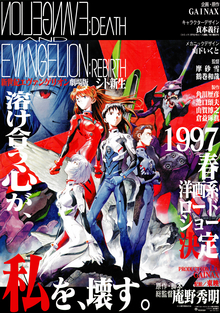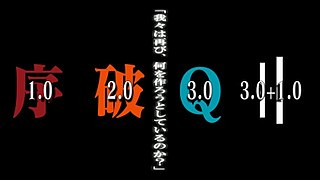
Anime is hand-drawn and computer-generated animation originating from Japan. Outside Japan and in English, anime refers specifically to animation produced in Japan. However, in Japan and Japanese, anime describes all animated works, regardless of style or origin. Many works of animation with a similar style to Japanese animation are also produced outside Japan. Video games sometimes also feature themes and art styles that are sometimes labelled as anime.

Neon Genesis Evangelion, also known as Evangelion or Eva, is a Japanese mecha anime television series produced by Gainax, animated by Tatsunoko, and directed by Hideaki Anno. It was broadcast on TV Tokyo from October 1995 to March 1996.

Voices of a Distant Star is a Japanese science fiction original video animation (OVA) short film created and animated by Makoto Shinkai. It follows the lives of two close childhood friends, a boy and a girl, who are separated when the girl is sent into space to fight in a war against aliens. As the 15-year-old girl goes deeper and deeper into space, the texts she sends take longer to reach the Earth; the film simultaneously follows her battles and the boy's life as he receives her texts over the years.
The history of anime in the United States began in 1961, when Magic Boy and The White Snake Enchantress, both produced by Toei Animation, became the first and second anime films to receive documented releases in the country. Anime has since found success with a growing audience in the region, with Astro Boy often being noted as the first anime to receive widespread syndication, especially in the United States. Additionally, anime's growth in popularity in the US during the 1990s, commonly referred to as the "anime boom," is credited with much of anime's enduring relevance to popular culture outside Japan.

A.D. Vision Holdings, Inc. was an American multimedia entertainment distributor headquartered in Houston, Texas, and founded in 1992 by video game fan John Ledford and anime fans Matt Greenfield and David Williams. The company specialized in home video production and distribution, theatrical film distribution, merchandising, original productions, magazine and comic book publishing. They also ran Anime Network, a television channel devoted to airing the company's titles. Some of their titles were Neon Genesis Evangelion, Super Dimension Fortress Macross, RahXephon, Full Metal Panic, Azumanga Daioh, Elfen Lied, Gantz, Red Garden, and Le Chevalier D'Eon.

Hideaki Anno is a Japanese animator, filmmaker and actor. His most celebrated creation, the Evangelion franchise, has had a significant influence on the anime television industry and Japanese popular culture. Anno's style is defined by his postmodernist approach and the extensive portrayal of characters' thoughts and emotions.

Nadia: The Secret of Blue Water is a Japanese anime television series created by NHK, Toho, and Korad, from a concept of Hayao Miyazaki, and directed by Hideaki Anno of Gainax. Inspired by the works of Jules Verne, particularly Twenty Thousand Leagues Under the Seas and the exploits of Captain Nemo, the series follows young inventor Jean and former circus performer Nadia, who are led off to adventure by a secret in Nadia's pendant.

Sgt. Frog, known in Japan as Keroro Gunso, is a Japanese manga series written and illustrated by Mine Yoshizaki. It was launched in Monthly Shōnen Ace in April 1999. The story follows the attempts of a platoon of frog-like alien invaders to conquer Earth. Sergeant Keroro, the titular character, is the leader of the platoon, but is at the mercy of a human family of three after being captured by them. Keroro is forced to do meaningless chores and errands for the family after his army abandons his platoon on Earth. The series was later adapted into an anime television series by Sunrise, which ran for 358 episodes from April 2004 to April 2011. A second 23-episode series was broadcast from March to September 2014. A new anime project has been announced.
John Robert Ledford II is an American entrepreneur and producer in the anime industry. He founded A.D. Vision, Anime Network, Newtype USA and Sentai Filmworks, and has been an executive producer for hundreds of anime titles including Halo Legends, Appleseed Alpha, Short Peace, Sailor Moon, Hello Kitty, and the dubbing of Neon Genesis Evangelion.

The End of Evangelion is a 1997 Japanese anime apocalyptic science fiction film written by Hideaki Anno, directed by Anno and Kazuya Tsurumaki, and animated by Gainax and Production I.G. It serves as an alternate ending to the television series Neon Genesis Evangelion, which aired from 1995 to 1996 and whose final two episodes were controversial for their atypically abstract direction.

Central Park Media Corporation, often abbreviated as CPM, was an American multimedia entertainment company based in New York City, New York and was headquartered in the 250 West 57th Street building in Midtown Manhattan. They were one of the first companies to be active in the distribution of East Asian cinema, television series, anime, manga, and manhwa titles in North America, notably helping to make hentai popular in the region. Over its history, the company licensed several popular titles, such as Slayers, Revolutionary Girl Utena, the Tokyo Babylon OVAs, Project A-ko, and Demon City Shinjuku.
VIZ Media, LLC is an American entertainment company headquartered in San Francisco, California, focused on publishing manga, and distribution and licensing Japanese anime, films, and television series.

Neon Genesis Evangelion: Death & Rebirth, also romanized in Japan as Evangelion: Death and Evangelion: Rebirth, is a 1997 Japanese science fiction mecha anime. It is the first installment of the Neon Genesis Evangelion feature film project and consists of two parts. The project, whose overarching title translates literally to New Era Evangelion: The Movie, was released in response to the success of the TV series and a strong demand by fans for an alternate ending. Its components have since been re-edited and re-released several times.

Media Blasters, sometimes abbreviated as MB, is an American entertainment company that was founded by John Sirabella in 1997 and is based in New York City. It is in the business of licensing, translating, and releasing to the North American market manga and anime compilations, Asian films and television series, adult anime, monster movies, concert films, independent films, horror films, and exploitation films. Over its history, the company has licensed several popular titles, such as Rurouni Kenshin, Berserk, Bakuman, Shamanic Princess, Weiß Kreuz, Jubei-chan: The Ninja Girl, Chu-Bra!!, Grenadier, Holy Knight, Elf Princess Rane, Voogie's Angel, Iron Virgin Jun, Ultimate Girls and Blade of the Immortal.

Rebuild of Evangelion, known in Japan and on Amazon Prime Video as Evangelion: New Theatrical Edition, is a Japanese animated film series and a retelling of the original Neon Genesis Evangelion anime television series, produced by Studio Khara. Hideaki Anno served as the writer and general manager of the project, with Kazuya Tsurumaki, Masayuki, Mahiro Maeda and Katsuichi Nakayama directing the films themselves. Yoshiyuki Sadamoto, Ikuto Yamashita and Shirō Sagisu returned to provide character designs, mechanical designs and music respectively.

Evangelion: 3.0 You Can (Not) Redo. is a 2012 Japanese animated science fiction action film written and chief directed by Hideaki Anno and the third of four films released in the Rebuild of Evangelion series, based on the original anime series Neon Genesis Evangelion.

SXION 23 LLC, doing business as Section23 Films, is an American multimedia distributor based in Houston, Texas specializing in releasing anime and Japanese films. Established in 2009, Section23 is one of five successors to ADV Films; alongside Sentai Filmworks, Switchblade Pictures, Maiden Japan, and AEsir Holdings. The company is named after a Texas tax code.
Mega-Anime is a Russian distributor of anime content from Japan. It was founded in 2005. It was founded by Megaliner Entertainment.

Neon Genesis Evangelion is a Japanese media franchise created by Hideaki Anno, originally owned by Gainax and currently owned by Khara. Most of the franchise features an apocalyptic mecha action story, which revolves around the paramilitary organization NERV and their efforts in fighting hostile beings called Angels, using giant humanoids called Evangelions that are piloted by select teenagers. Subsequent works deviate from this theme to varying degrees, focusing more on romantic interactions between the characters, plotlines not present in the original works, and reimaginings of the conflicts from the original works.

Adolescence of Utena is a 1999 Japanese anime film. It is a follow-up to the 1997 anime television series Revolutionary Girl Utena, created by the artist collective Be-Papas. The film is directed by Kunihiko Ikuhara, written by Yōji Enokido based on a story by Ikuhara and produced by the animation studio J.C.Staff. An English-language dubbed version of the film produced by Central Park Media was released in 2001 as Revolutionary Girl Utena: The Movie.















